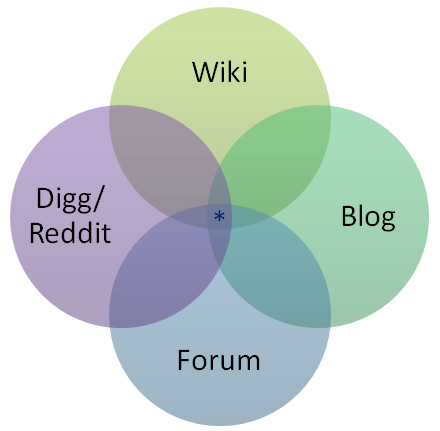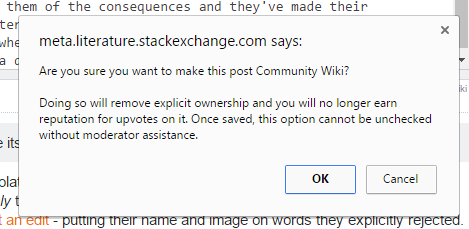Should a moderator remove its community wiki status?
No. I would consider this a violation of the author's prerogative. They have the choice to make their answer CW, which affects only their answer; overriding that under normal circumstances would be akin to forcing them to accept an edit - putting their name and image on words they explicitly rejected.
A bit of background: Community Wiki has a long and troubled history on these sites, primarily because of its use in the now long-distant past on questions as a means of allowing otherwise-unsuitable discussions, polls and the like. For a very long time, the system actually forced CW onto posts that attracted either a large number of answers or a large number of edits... But we put that behavior to rest nearly 3 years ago now, leaving the use of CW at the discretion of answer authors in the common case, and moderators for extremely uncommon cases:
An author can still apply the status manually when posting or when editing their own answer, and moderators retain the ability to apply it when they deem it truly necessary (for instance, a question attracting very large numbers of partial answers can be a sign of a topic that wants to be a wiki). For the most part, we’ve turned it back into something that you can choose to use in cases where it lets you work together to create something wonderful: [...]
Much longer background: chimerical moral rights
These sites are a delicate balance between multiple systems and philosophies. The original documentation explained them with this diagram:

Naturally, this results in a fair bit of conflict between how folks expect things to work and how they actually work - on all sides of the equation. A member used to a traditional online forum might expect to post questions or replies and never update them; a blogger might expect to update their own posts but never see another editor messing with them; a wikian might expect to readily edit anything.
Achieving a harmonious balance of expectations here is critical to the long-term viability of a community.
When the goal of a site is to serve as a repository of information for future readers, a sense of community ownership is needed - we cannot forever hold an individual author responsible for updating or even disseminating information. At the same time, individual ownership provides a great deal of motivation: both the reputation score and the simple ability to point to a profile filled with useful, informative posts are extremely satisfying to many who participate here. So we cannot entirely overlook one in favor of another without either alienating other members of the site or hurting its usefulness.
And in the place where this system sits - in between extremes - there lives an often-overlooked set of concerns, something often referred to in legal areas as "moral rights". As is often the case with concepts that've been codified in law, finding a clear, succinct explanation for these can be difficult; I like this one, which I found on the website of the Australian law firm Epiphany Law in the article, "What Are Moral Rights?"
In contrast, the moral rights recognise the connection between a creator and his or her work. They are concerned with whether the creator has been properly linked with the work and whether the work has been treated with dignity (or at least not in a derogatory way).
Consider for a moment what these sites do with the material that we all write on them: they combine it with the work of others, allow others to modify it, and allow others to take and build upon it. Your beautiful question may be sullied at any time by an answer you find offensive, or advertised on another site dedicated to a topic you find reprehensible; your carefully-crafted answer may be shown next to a sloppy and incorrect one, quoted by someone who misinterprets it. They're still "your" posts, but you've ceded control over how they are used, and this opens you up to situations in which you may find yourself very unhappy with the uses they are put to.
This is a dilemma that we've struggled with for the entire 9+ year history of the network, and the often-subtle underpinning of a great many odd features and unusual rules. To name a few:
By default, authors can delete their posts for any reason... But if the post has proven itself useful in some way, or been build on by the work of others, deletion may be prevented or reversed.
By default, authors have the final say in what appears in their posts... But if a given edit is deemed necessary to preserve or greatly increase its usefulness, they may be overruled.
Authors can delete their account at any time... But we may retain any posts associated with it that have been deemed useful to others.
Authors can request that their name be removed from a post at any time. This is actually codified in Section 4(a) of the license to which all participants must agree to post under, though exactly how we implement it can vary.
But among all the features in this system, Community Wiki is by far the strangest and least well-understood.
Hunt the CWumpus
The actual function hasn't changed in years - a post marked as CW differs from a normal post in that they...
- ...do not contribute to the reputation score of its original author or any subsequent authors.
- ...do not contribute toward certain badges, including tag badges.
- ...can be edited without peer review by any member of the site who has earned the edit community wiki privilege.
- ...are attributed on the question page only to the original author by name, and only as long as that author has contributed a majority of the text in the post. If a subsequent editor achieves a large majority of authorship, their name will be displayed; if no large majority can be attributed to a single author, no name is displayed by default; rather, a link to the revision history containing each author's contribution is displayed.
- ...never display an author's profile image or other profile statistics on the question page.
The goal of this feature is clearly to bump a given post a little bit further away from the "forum" side of that euler diagram and a little bit closer to the "wiki" side. But what that actually means goes much further than just making it a bit easier for others to edit: there's a very clear de-emphasis of author-ownership, both in how the post is displayed and in how the system treats it. This is made explicit when an author elects to make a post CW:

A few things to note there:
- You're giving up explicit ownership. Behind the scenes, your account still "owns" the post (it appears in your profile, you get more weight when approving or rejecting suggested edits, you get notified of comments, you can still delete it). But you don't get ultimate credit for it, either in terms of how it is displayed on the page, or in terms of how the system rewards you for it.
- You can't "take it back". Once you've handed over ownership to the community, it's theirs - the status sticks to the post no matter how many subsequent edits you make... Or how few subsequent edits anyone else makes.
Community Wiki got a bum rap for years, mostly because it was forced onto posts by the system or other users. We had good intentions there, but... It was a bad idea and we no longer do that. What remains is actually pretty cool, if you look at it from the perspective of what it enables: authors can symbolically give up ownership of a post at any time.
Note that this clearly isn't a legal action; that pop-up dialog is less than a page long. You retain the copyright to anything you write here. But it does align itself with some of those moral rights we discussed earlier: you get to say - in a public way, totally under your control - that you no longer want sole credit for a given post.
For all of the controversy that has plagued CW over the years, that particular usage has remained remarkably consistent: as far back as I can remember, folks have reached for CW when they didn't feel like taking credit for an answer. Now, sometimes this has seemed a little bit dirty, even manipulative: marking a post CW to avoid getting dinged by downvotes, or to keep your reputation at an even 10K for example. But it's also been used to acknowledge the contributions of others to a FAQ or omnibus answer - even if no one else ever edits, by de-emphasizing the author more focus is put on the words - and attributions - in the post itself.
And on the topic of...
Abuse
One of the most often-cited criticisms of authors using Community Wiki on answers is that they might do so to shield themselves from the penalty imposed by downvotes. This is almost never valid; in nearly any situation where it would matter, the author is allowed to delete the post at any time, which also immediately refunds any reputation lost to downvotes. In fact, CW makes downvotes on answers free to the voter as well, which can mean a bad answer is more readily downvoted. Moderators and trusted users are not hindered from deleting CW answers, so nothing in the status hinders moderation and may in fact encourage it.
The more subtle concern I think is...
Peer pressure breaking windows
A long, long time ago, when Stack Overflow was young and the rocks were still all red and soft, a few of us got it into our heads that it'd be a great idea to pressure other people into making their posts CW in cases where they were clearly undeserving of reputation.
...we didn't have very good luck with this and eventually gave up. But, the fact remains, we did try. And maybe others would try again, somewhere else where the proverbial rocks are still soft and runny. So, the specter looms whenever CW is brought up.
I sympathize with this. But, ultimately it is harassment that is the problem here, not CW. If, for example, it becomes commonplace for authors to use CW on posts that are mostly quotes, then what harm is there in that if they do so by choice? Either the answers are problematic in the same way that they would be without CW, or they are not problematic; only if the authors are harassed when they do not use CW is there a problem, just as there is a problem when authors are harassed for any other reason.
Summary
If an author chooses to use Community Wiki, that's their business - the system has informed them of the consequences and they've made their decision. If you encounter one of those rare situations that demands a wiki answer, especially one where only a wiki answer is appropriate for a given question... Then raise a discussion and get the moderators involved. If you observe harassment, flag it. If you see a bad answer, downvote it; a good one, upvote it. And if you don't see a problem... Don't make one. Each day has sufficient problems as it is.